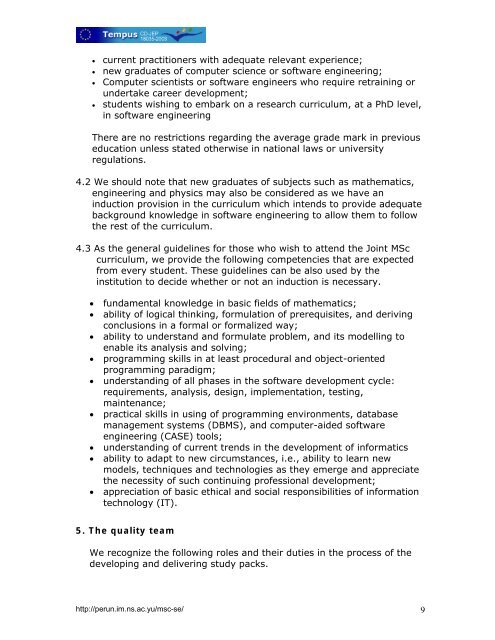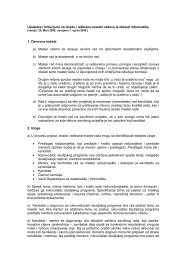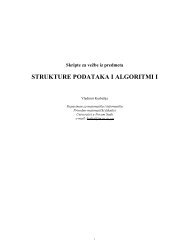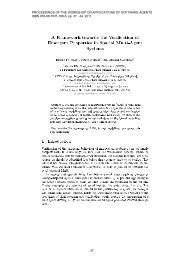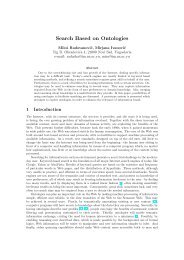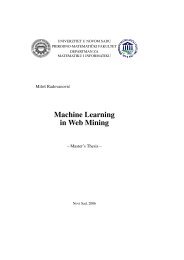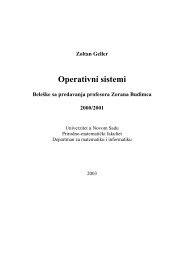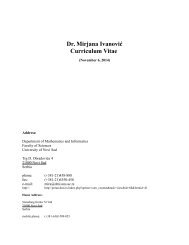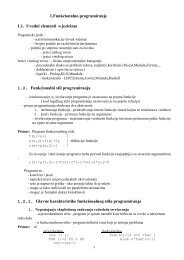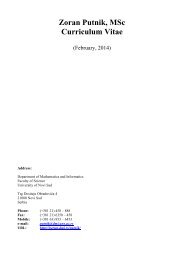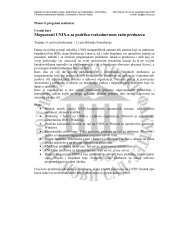Full document describing all aspects of the curriculum, release 2 (pdf)
Full document describing all aspects of the curriculum, release 2 (pdf)
Full document describing all aspects of the curriculum, release 2 (pdf)
Create successful ePaper yourself
Turn your PDF publications into a flip-book with our unique Google optimized e-Paper software.
• current practitioners with adequate relevant experience;• new graduates <strong>of</strong> computer science or s<strong>of</strong>tware engineering;• Computer scientists or s<strong>of</strong>tware engineers who require retraining orundertake career development;• students wishing to embark on a research <strong>curriculum</strong>, at a PhD level,in s<strong>of</strong>tware engineeringThere are no restrictions regarding <strong>the</strong> average grade mark in previouseducation unless stated o<strong>the</strong>rwise in national laws or universityregulations.4.2 We should note that new graduates <strong>of</strong> subjects such as ma<strong>the</strong>matics,engineering and physics may also be considered as we have aninduction provision in <strong>the</strong> <strong>curriculum</strong> which intends to provide adequatebackground knowledge in s<strong>of</strong>tware engineering to <strong>all</strong>ow <strong>the</strong>m to follow<strong>the</strong> rest <strong>of</strong> <strong>the</strong> <strong>curriculum</strong>.4.3 As <strong>the</strong> general guidelines for those who wish to attend <strong>the</strong> Joint MSc<strong>curriculum</strong>, we provide <strong>the</strong> following competencies that are expectedfrom every student. These guidelines can be also used by <strong>the</strong>institution to decide whe<strong>the</strong>r or not an induction is necessary.• fundamental knowledge in basic fields <strong>of</strong> ma<strong>the</strong>matics;• ability <strong>of</strong> logical thinking, formulation <strong>of</strong> prerequisites, and derivingconclusions in a formal or formalized way;• ability to understand and formulate problem, and its modelling toenable its analysis and solving;• programming skills in at least procedural and object-orientedprogramming paradigm;• understanding <strong>of</strong> <strong>all</strong> phases in <strong>the</strong> s<strong>of</strong>tware development cycle:requirements, analysis, design, implementation, testing,maintenance;• practical skills in using <strong>of</strong> programming environments, databasemanagement systems (DBMS), and computer-aided s<strong>of</strong>twareengineering (CASE) tools;• understanding <strong>of</strong> current trends in <strong>the</strong> development <strong>of</strong> informatics• ability to adapt to new circumstances, i.e., ability to learn newmodels, techniques and technologies as <strong>the</strong>y emerge and appreciate<strong>the</strong> necessity <strong>of</strong> such continuing pr<strong>of</strong>essional development;• appreciation <strong>of</strong> basic ethical and social responsibilities <strong>of</strong> informationtechnology (IT).5. The quality teamWe recognize <strong>the</strong> following roles and <strong>the</strong>ir duties in <strong>the</strong> process <strong>of</strong> <strong>the</strong>developing and delivering study packs.http://perun.im.ns.ac.yu/msc-se/ 9


